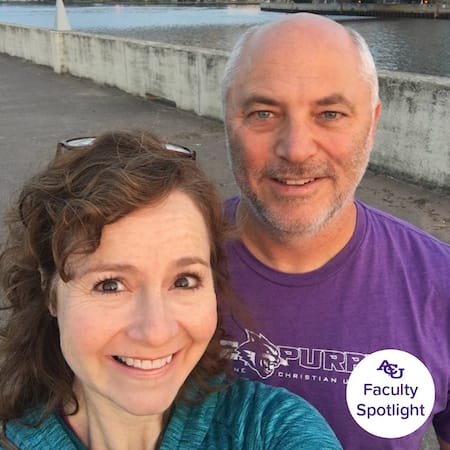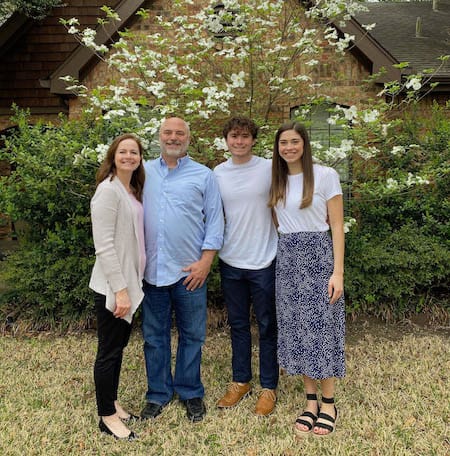“Where and how is the Spirit of God moving and how can we join and partner with God there?” This is the question at the center of Dr. Chris Flanders’ theology of missions. And it’s the same question igniting a new generation of missionally-minded Christians at ACU. Read on to learn how this American born, Midwest-raised educator ended up planting churches in Thailand and now leads ACU’s online Master of Arts in Global Service.
Hearing the Call
Dr. Chris Flanders has had a long-time relationship with Abilene Christian University. Born in the Midwest and raised in his hometown of Duluth, Minnesota, Chris moved to Abilene to pursue a bachelor’s degree in Biblical Text. During the course of his undergraduate years, he participated in a mission internship in Thailand. This experience deeply affected him and resulted in a two-year post-graduation apprenticeship program in the country, overseen by the ACU missions faculty. After this internship, he came back to ACU in order to earn his Master of Missions and Master of Divinity. While he was working on his graduate degrees, Chris met his wife Cara as she was doing her own graduate work in marriage and family therapy.
As he and Cara were in school, Dr. Flanders kept feeling a persistent tug to return to Thailand. They perceived that God was calling them to serve as missionaries. So, the couple got married, joined a church-planting team, and did a one-year team training internship at ACU before leaving for Thailand. For the next eight years, Chris and Cara worked in northern Thailand with native Thai people to spread the Gospel, plant churches, and establish healthy, durable communities rooted in God’s mission
Dr. Flanders, his wife and their children returned to the United States in 2001. Once back in the States, Dr. Flanders pursued his Ph.D. in Intercultural Studies from Fuller Theological Seminary. After that, he returned to his alma mater to work as a professor in the undergraduate Department of Bible, Missions, and Ministry and the Graduate School of Theology (GST) in 2005.
Bringing the Mission Home
Chris’ first foray into online education was in 2011, when he developed and taught his first online missions class. Ever since then, he’s grown increasingly comfortable and even passionate about it. “I’m really happy to do online education,” he enthuses. “With an in-person class, it’s easy for the loudest, most outgoing people in the front of the classroom to take over the conversation—often leaving the quieter, more introverted people in the back to disengage.” But, in his experience, online video conferencing classes, with the “flatness” of a Zoom classroom, actually enables quieter students to be heard more frequently.
Dr. Flanders also prevents students from “fading into the background” online by intentionally developing supportive, personal relationships. In addition to the normal ‘facetime’ he gets with his students in class on Zoom, he always schedules two meetings with online students during the semester: one for academic advising and the other for individual check-ins. This style of advising and connection also enables him to offer maximum flexibility for his students.
Most importantly, Dr. Flanders finds online education perfectly suited to training ministers and missionaries, because he’s constantly hearing about or being approached by “students who could never step on ACU’s campus, but want equipping to serve the Kingdom.” Online education, for him, is a way to offer much-needed resources to this population and expand ACU’s reach beyond Abilene, Texas, and even the United States.
Following God’s Mission Forward
When considering the future of his and other ministry programs at ACU, Dr. Flanders is far more upbeat than many on theological education. One stark statistic illustrates this pessimism: since 2016 there have been 60 nonprofit college closings or mergers, twenty-five of which were church affiliated, and nine seminary closures in the last decade, most of them in the last five years.
Dr. Flanders knows these numbers and is quick to establish he’s not blindly or naively optimistic. In his words, he’s ”concerned, sober, yet hopeful.” A large part of this sober hope comes from his connections to the broader world of global Christianity. American seminaries and institutional forms of Christianity may be struggling in the 21st century. But, he also knows ministers and professors at seminaries in Ghana parts of the world who have to turn students away because there’s so much demand. He sees Christianity numerically exploding in the Global South, in regions like Latin America, parts of Asia, and all over the continent of Africa.
He sees this growing global mindset and diversity within his students. Whereas in his generation of missional education class, the typical seminarian was a white, 20-something man—the typical missionary is now looking very different. At ACU Online, Dr. Flanders now educates both older adults who have come back to pursue theological education after perceiving God’s call and more ethnically diverse students.
An exciting trend has also been how the notion of ‘mission’ has expanded. For over 100 years, an emphasis on overseas church-planting defined Christian missions. According to Dr. Flanders, the de facto model of missions was “the West to the rest.” More affluent and established Christian churches and denominations in America and Europe would send their missionaries to other nations to “bring them the Gospel.”
Now though, as the centers of global Christianity shift to South/Central America and Africa—the methods and terminology is shifting too. “Now instead of going on mission to you, we’re shifting to mission with you,” Dr. Flanders explains; it’s not so focused on Western Christianity. Also, rather than ‘missionary,’ Dr. Flanders is noticing that this new generation of Christians prefers terms like “partner, learner, and servant learner.”
Even though the terminology, methods, and questions are shifting—the fundamental skills that Dr. Flanders teaches are still essential; “basic competencies that we teach like intercultural communication are always needed.” And, as missionaries explore innovative alternatives to cultural missional engagement, they still “need a good theology of mission.” If anything, the “grounding of a robust vision of God’s mission” is more essential than ever.
Dr. Flanders is well aware of his mission: “My job is to equip my students to be relevant to their context, and faithful to their witness. It’s a challenging relevancy, but the spread of the Gospel is God’s work.” We don’t bring the Kingdom—we just get to tag along and join with it wherever it already is. And Dr. Flanders is honored that he gets to share that liberating message with his students.
Want to partner with the world-changing work happening in ACU’s Graduate School of Theology? Learn more about our online Master of Arts in Global Service!


